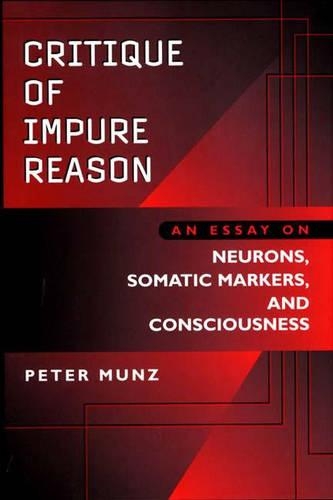
Critique of Impure Reason: An Essay on Neurons, Somatic Markers, and Consciousness
(Hardback)
Publishing Details
Critique of Impure Reason: An Essay on Neurons, Somatic Markers, and Consciousness
By (Author) Anne Munz
Bloomsbury Publishing PLC
Praeger Publishers Inc
28th February 1999
United States
Classifications
Tertiary Education
Non Fiction
Cognition and cognitive psychology
Neurosciences
126
Physical Properties
Hardback
264
Description
Thanks to the enormous progress of neuroscience over the past few decades, we can now monitor the passage of initial stimulations to certain points in the brain. In spite of these findings, however, subjective consciousness still remains an unsolved mystery. This volume exposes neuroscience and cognitive science to philosophical analysis and proposes that we think of our conscious states of mind as a composite phenomenon consisting of three layers: neuronal events, somatic markers, and explicit consciousness. While physics and chemistry can and have been successfully employed to describe the causal relation between the first two layers, the further step to articulate consciousness is purely interpretative and points to the preponderant importance of language. Language is essential for the transformation of inchoate, not very informative somatic markers and mere moods into full consciousness and appraised emotion. Munz uses literary examples to shift our understanding of the mind away from computational models and to show how eloquence about our states of mind is manufactured rather than caused. He firmly rejects the efforts of both Freud and non-Freudian psychologists to find a scientific explanation for such manufacture and to make a science out of the eloquence of folk psychology. Instead he argues that the many ways eloquence is being manufactured to transform somatic markers into conscious states of mind are best accounted for in terms of Wittgenstein's conception of language games. This volume challenges most current thinking about consciousness and mind and will appeal to philosophers, psychologists, neuroscientists, and linguists.
Reviews
"'The neurons are silent.' With this simple yet devastating insight Munz brings to an abrupt halt generations of arguments about, and proposed solutions to the 'mind-body' problem. He offers his own solutions which will, I am sure, bring forth assailants from all quarters. They will have to have very sharp weapons if they are to make any dents in his argument that consciousness is a vague term we use to indicate our awareness of neurons at work. The argument is nimbly balanced on a tight rope which stretches between Popper and Wittgenstein and leads to the conclusion that what we think of as 'cognitive neuroscientific psychology' is about as successful as Freud's now worn out effort to turn folk-psychology into a science. It solves yet another problem: how to write a scholarly book that is not just readable, but downright entertaining. If you cannot agree with the argument, you will admire the wit."-Peter J. Wilson Professor of Anthropology, Otago University, New Zealand
"In this important book, Professor Munz demonstrates the inadequacy of the cognitive scientists' reductionistic claims about explaining consciousness and the soundness of our intuitive sense that 'minding' cannot be divorced from the distinctively human act of linguistic communication. I recommend this work highly to professionals in the 'mental sciences' and lay persons alike."-Thomas Szasz Professor Emeritus of Psychiatry State University of New York Health Science Center, Syracuse
Author Bio
PETER MUNZ has taught medieval history at Victoria University of Wellington, New Zealand, and has published many books and papers on the thought and politics of the early Middle Ages. After studying in his youth under both Popper and Wittgenstein, he has pursued his interest in philosophy by writing several philosophical books, including The Shapes of Time (1977), Our Knowledge of the Growth of Knowledge (1985), and Philosophical Darwinism (1993).
